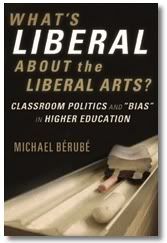A Review of What’s Liberal About the Liberal Arts?: Classroom Politics and “Bias” in Higher Education by Michael Bérubé
by Aaron Barlow
See the full review at the ePluribus Media Journal.
Today, the liberal tradition is in peril; the very attitudes providing its underpinning are in danger of disappearing. Much of its past success can be linked to a certain cultural acceptance of the idea that concepts such as “good” and “bad” are rooted in human beings and do not arise from a necessary external foundation–or from any certain epistemology.
“We hold these truths to be self-evident” says the Declaration of Independence. Jefferson originally wrote “We hold these truths to be sacred and undeniable,” a phrase with a different meaning altogether, for it posits an external source of the “truths” in a way the final version does not. Americans, for more than two hundred years, understood the distinction between “self-evident” and “sacred,” which moves the basis of the “truths” beyond human construction. For the last few decades, that recognition has been fading.
Today, the idea that truth (self-evident or not) lies within us is a dangerous concept, for it opens the door to consideration that truth is transient or relative, undercutting (in their view) all morality. Yet, if nothing else, a constant questioning of the truths we see can keep us from repeating the more abominable acts of human beings. But that’s the “liberal” position.
Increasingly, such an attitude is rejected in the United States. Ours is a time of belief in “truth,” an emotion so strong that it leads many to seek to destroy (figuratively, for the most part) those who see “truth” as anything but an absolute.
Not for liberals, though. As liberalism is as concerned with method as with results, it invites discussion and compromise–and even invites results that may not jibe with expectations or desires. As Michael Berube writes in What’s Liberal About the Liberal Arts?:
The university is one of the last remaining areas in American life dominated by liberals–and dominated by a most curious kind of liberal, namely, liberal intellectuals who are committed both to substantive and procedural liberalism, for a form of pluralism and reasoned debate that does not always culminate in liberal conclusions. (24)
Aside from the sheer frustration that the right has over this one area that remains unconquered, one of the many things the right doesn’t get about liberalism in our universities is that liberalism is quite simply and primarily a methodology, not merely an ideology. So, when they attack liberalism (or so they think) through what they see as its ideological stances and conclusions, they are often frustrated when told that they don’t get it–and that the points they think they’ve scored don’t impress anyone but themselves.
The heart of Bérubé’s book is his two chapters describing his teaching, one on an American Literature survey, the other on an advanced course on postmodernism. It is here where Bérubé attempts his end-run around attackers of academia like Horowitz, writing to the general public about what he does, exactly, in the classroom so that readers can judge without having to negotiate a rightwing filter.
There are signs other than Bérubé’s book, of course, that liberalism is now on the rebound. Progressive radio has started to make inroads into what was once an almost purely conservative medium–talk radio. And liberal blogs are, today, far and away more popular than their conservative counterparts. Perhaps this book will add to that movement, proving to be part of the renewal of pride in a tradition as central to the success of the United States and American culture as any that our country has seen. Bérubé, certainly, never attempts to excuse liberalism; instead, he champions it.
Other ePluribus Media contributors to preparing this review include: Greyhawk, Tanya, and Vivian.
If you like what ePMedia’s been doing with research, reviews and interviews, please consider donating to help with our efforts.


